The RSA’s Fellowship network is a huge resource for social change. My recent visit to Finland confirmed just how universal the RSA’s values are, and their ability to spur a movement regardless of which country you’re in.
'How many people does it take to change a small country?'
This is the question asked by Mika Aaltonen, Finnish RSA Connector, former footballer, serial entrepreneur and visionary of what it means to be a RSA Fellow in Finland. Mika hosted Adanna Shallowe and I as we make our first visit to the Finnish Fellows in Helsinki.
For the past five years Mika has been carefully and purposely assembling a group of free-minded professionals under the banner of the RSA Fellowship. In the RSA he sees the enlightenment values of freedom, justice and progress sitting powerfully alongside political independence and a high level of integrity and intellect on matters of today, and tomorrow. For him, a small country like Finland will benefit immensely from a dynamic network that is inspired by these values and wants to make the country better.
Not that Finland is doing badly compared to other European countries, but it does have its share of tough decisions to make. The Finnish economy has been contracting for the fourth year in a row due to weak demand from European and Russian markets and problems affecting its key industries especially technology. Significant job layoffs by tech giants such as Nokia and Microsoft and reduced demand in ship building and paper industries has significantly increased unemployment. With an unsustainable level of public spending Finland it needs to think differently about how it designs its society and economy.
There are over 170 RSA Fellows in Finland, including an impressive gender split of 50/50 male to female (the RSA average is 70/30 male to female). I was invited to present a keynote to the Fellows at their annual Design Day, an event that launches the RSA Student Design Awards in Finland. Hosted in the functionalist (yet ever-so-pleasing-to-the-senses) building of Finland’s largest law firm, Castren & Snellman, around thirty people attended a morning of presentations and discussion - and what a discussion!
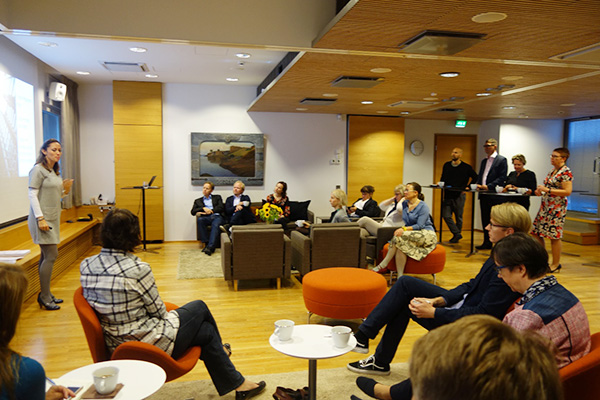
I centred my keynote on the RSA’s strategy of the Power to Create i.e. turning ideas into reality, and why this is ever important today if we are going to achieve our mission of a 21st Enlightenment- a world where every single person has the confidence, opportunity and motivation to lead a creative life. This resonated with the Fellows, and they immediately debated key issues in Finnish society through the lens of Power to Create: how to reduce public service spending in new and creative ways by connecting with the community, the challenges and barriers civil servants face when making courageous decisions, political paralysis, and ultimately, the type of role the RSA in Finland can play. At 9:45am the room was alive with debate and discussion, all conducted in a hugely respectful manner that concluded with the suggestion of the RSA creating a public platform for the topic.
The RSA Student Design Awards presentation followed in a similar fashion. Actually, the Fellows were suggesting ways to grow the SDAs and design for social good in Finland as soon as I had stopped talking. This year one of our sponsors heralds from this group: Fazer is the largest bakery in Finland and we are delighted that they are sponsoring a brief about reducing food waste.
Now, all this energy and enthusiasm might seem usual or expected to some, but I personally find it inspiring. I’m impressed that a group of people take time out of their busy days – be they lawyers, designers, managers, consultants, researchers, architects or freelancers – to talk about how to make their place better. I get why they do it – it is because they are energised by each other and have a strong sense of ownership over this network. From what I can see the Fellows have nurtured a culture based on:
- RSA values: Fellows are invited to join this network if they share the RSA’s values i.e. to support progress in Finland in a practical way. Many told me that those who want to promote their own agendas are discouraged from joining, and leave pretty quickly if they do because they find no place in the network.
- Respect: people may disagree with each other’s ideas, but are not allowed to attack the individual. Everyone is expected to have an equal voice.
- Equality: they take great pride in their gender split and make a proactive effort to recruit men and women in equal numbers. As one Fellow said “I always count how many women are here when I attend.”
- Ownership: although Mika is the driving force it is evident that the Fellows feel a sense of belonging and ownership about what they do as a group, because ideas are freely generated and acted upon collectively.
- Action: ‘it’s all about impact’ is what I heard from one Fellow. They have a clear focus on just doing stuff that fits with their values and understanding of why they contribute their time and energy.
And that’s exactly what it is – a self-managed collective of people who share the same values to just ‘do stuff’ and make Finland better. Frederic Laloux would be pleased, and would say that this is the future for all of us.
Perhaps the most inspiring of all is Mika himself and the vision he has for Finland. How many people does it take to change a small country? He thinks around 500 but the number isn’t actually important. He wants the right people who will contribute to the network and create opportunities to put the RSA’s values into practice.
Meeting the Finnish Fellows and hearing their dynamism is energising and raises all the questions we have yet to answer: how will the RSA manifest its mission around the world? What does it mean to be a Fellow in Germany, South Africa, Chile and Singapore? How will cultural values and norms shape the focus on creating a positive impact? (Suggestions welcome).
Being part of this journey is exciting, and witnessing the energy of the Finnish Fellows is an example of what believe the RSA can stand for around the world. It’s a beautiful reminder of why I joined this unique organisation in the first place.
To give you a flavour of the annual activities of the Fellows in Finland:
- Every January, there is a leadership seminar: this is a half-day session where an inspirational speaker is invited to present (our own Matthew Taylor attended a couple of years ago) and the Fellows engage in discussion and group work to generate ideas for the year ahead.
- Monthly meetings to watch a RSA Public Lecture: they watch the presentation and have a debate about how the topic relates in Finland. Meetings mirror the London debate, the whole event last only one hour.
- Every September there is Design Day: this is a two-hour session that sits naturally with the Finnish affinity for design but it is unique in that it is centred on design thinking with a social purpose. The Fellows hear about the new RSA Student Design Award briefs and discuss how to promote it that year.
- Annual autumn study trip: up to 20 Fellows visit a distinguished location such as Venice, Paris or London for three days, taking in a range of cultural, artistic and intellectual venues i.e. in Paris they visited the OECD and met with the Deputy-Secretary General Mari Kiviniemi.
- Time-specific projects: these are projects selected and initiated by Fellows, such as:
- Dual mentorship programme where Fellows were matched with a younger counterpart and each mentored each other, meeting around four times a year.
- Translating Adam Smith’s The Wealth and Enquiry of Nations into Finnish. This was a two-year endeavour that once complete, the Fellows published and donated the book to every library in Finland.
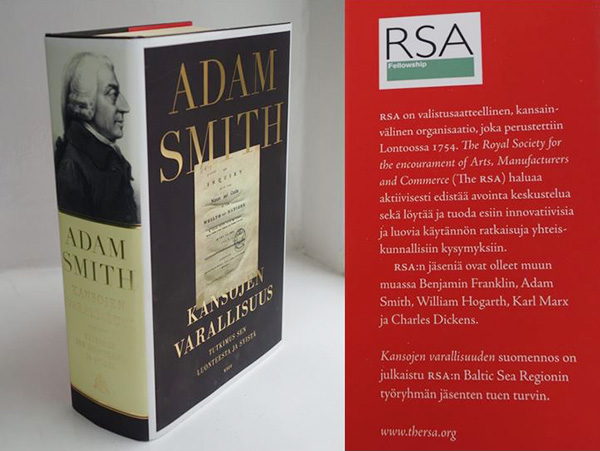
Related articles
-
A design revolution for the climate emergency
Joanna Choukeir
Joanna Choukeir on Design for Planet, the global gathering of designers during COP26, and the changes design must make.
-
US elections: the whole world is watching
Adanna Shallowe
The Caribbean’s experience shows how American policy affects us all.
-
The broader purpose of the environmental movement
Hila Chenzbraun Philipa Duthie
How can environmental movements tackle the climate crisis and social and racial injustice?
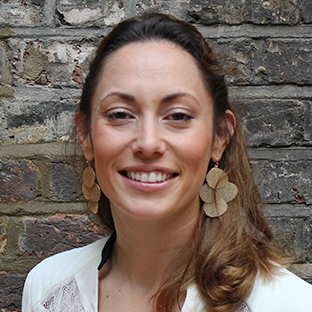
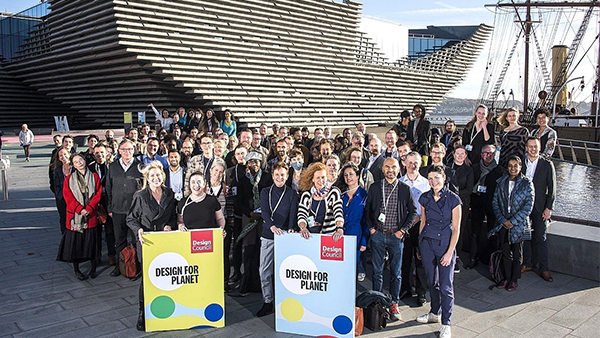
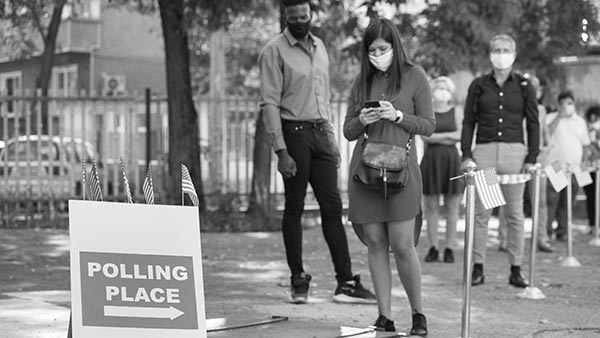
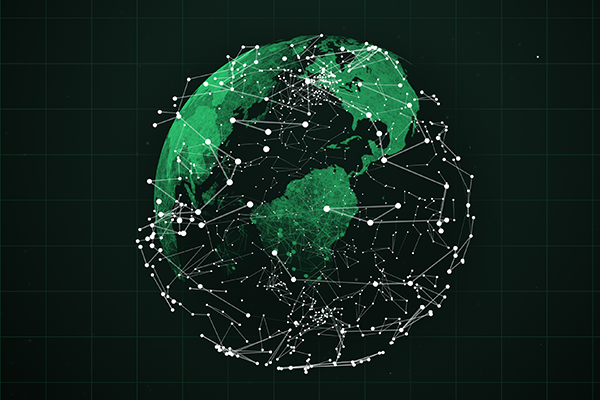
Join the discussion
Comments
Please login to post a comment or reply
Don't have an account? Click here to register.
Thank you Natalie, both for the blog and your visit. It was great to have you here.
Excellent! Maybe this will inspire people in some of the more far-flung regions of the UK too!